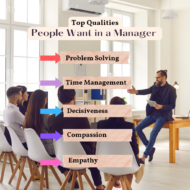Currently Browsing: Leadership
Posted by Managementguru in How To, Human Resource, Leadership, Motivation
on Jun 10th, 2023 | 0 comments

Being someone’s enemy isn’t exactly what you want to deal with in the workplace. Having a conflict, misunderstanding, or just even rubbing someone the wrong way can put even more stress into your work life. Although this is something every working company is going to experience at some stage, you just need to hope that you are not a part of it. If you are a manager, however, then you may be a top contender for this. Being overly disciplined can lead to staff members resenting or disliking you. This can then lead to a lack of cooperation or respect. It is not a good idea to just counteract your discipline with friendliness. Many, usually new, managers are too afraid to apply discipline for fear of hurting someone’s feelings. Although you might be everyone’s’ friend, it could harm the business. A lack of discipline is something that causes lots of cracks and issues throughout any business. Employees start taking things for granted and their working mentality might be affected. Finding a balance between the two is hard. However, it is something you should strive for in your manager role. Acting in the following manners can help you to apply this. Setting Rules and Protocols From the first day that you are the manager, it is time to get started on this balance. One of the best early decisions you could make is setting rules and protocols within the company. Having a strict list of rules means that you won’t have to make too many disciplinary judgement calls. If someone breaks the rule and the discipline has already been stated, then no one can judge you for being too harsh – you are just abiding by the rules. This can also be the case for the likes of routine checks. You don’t want to feel as if you are targeting employees, so having a scheduled check for everyone can help to avoid this. An example of this could be routine drug and alcohol testing. Start each week by using mobile drug testing that comes to you in your business. Being consistent with this means no one will feel targeted. Hearing Employees Out Employees are not going to agree with everything you say. Although these disagreements are common, you shouldn’t presume they are wrong just because you are the manager. Doing this will bridge a gap between employee equality, and your workers may feel belittled. So, in any instance from appealing a dispute or even just a suggestion, make sure you are hearing people out with open ears. Being Friendly When you are not disciplining someone or needing to act at your most professional, try to be as friendly as you can. Making small talk in the canteen is not going to affect the productivity of your business. What it might do instead is show employees that you are not such a bad person, even if you have had to apply discipline in the past....

Posted by Managementguru in How To, Human Resource, Leadership
on Mar 30th, 2023 | 0 comments

If you want to run a successful business and retain a team of dedicated staff members who are competent and who you can trust, then you need to make sure that you’re acting as a good manager as well. What makes a good manager? This is a question which sparks a large amount of debate amongst different people in different industries, which is understandable. However, the fact of the matter is that the elements which make a good manager at the surface level, remain relatively universal. This article is going to discuss in more detail some of the best things that you can do for your staff and your business to show that you’re a good manager. Allow For the Essentials The whole point of being a good manager is to make it so that your employees are happy working for you, and you can trust that they’ll do their jobs efficiently. It becomes harder to guarantee this if you’re not doing your bit too, in the sense that you need to make sure all your employees have access to the essentials in order to do their job. If they’re working from home, then set them up with the right equipment such as phones and laptops that will allow them carry out their roles to a high degree. If the job is office based, then make sure that you create a pleasant office environment which is comfortable and has all the necessities. A lot of business owners struggle with office space given the costs involved, so be sure to reach out to organisations who can provide electricity for small- to mid-size companies at the best price. Get to Know Your Employees Better It’s important that your employees have a voice, which means that you need to be taking the time to speak to them to work out how they feel about their role, the working environment, and your business, allowing them the chance to voice anything that they believe could be done better. You should set time aside for employee evaluations which will give them a chance to communicate effectively with you. You’ll likely learn something from them and be able to do your job better as a result. Even if the criticism is out of your control and there isn’t anything that you can do about it, you can still listen to your employees and acknowledge their comments. This will make them feel a part of the team and like they are a fundamental component to the business rather than just an employee. Be Motivational People don’t want to work for an employer who doesn’t motivate them and inspire them. As such, you need to have passion for your business, and you need to portray that passion in a way that people are going to be able to resonate with. Once you’re someone who people look up to and are proud to work for, you’re going to see much better results from your employees and you’ll cement yourself as a good...

Posted by Managementguru in Entrepreneurship, Leadership, Personality Development, Quotes and Quotes Only
on Oct 20th, 2021 | 0 comments

In continuation with “Top 25 Quotes from Womenpreneurs“, we thought of bringing you more awe-inspiring quotes and sayings from successful women in their respective careers, namely “39 Inspirational Quotes from Womenpreneurs.“ Not only these quotes are inspiring, but very practical that have born out of their life experiences. Definitely women who want to get inspired shall utilise these totally relatable and applicable pearls of wisdom in their life changing moments. We present to you “Meryl Streep” first who is legendary and iconic in her own way who has captured millions of women’s hearts not only through her versatile acting but also through her courageous words. Insta – @merylstreep Sheryl Sandberg, Facebook CEO, Author “Knowing that things could be worse should not stop us from trying to make them better.” Insta – @sherylsandeberg Hillary Clinton “Always aim high, work hard, and care deeply about what you believe in. And, when you stumble, keep faith. And, when you’re knocked down, get right back up and never listen to anyone who says you can’t or shouldn’t go on.” “The worst thing that can happen in a democracy–as well as in an individual’s life–is to become cynical about the future and lose hope: that is the end, and we cannot let that happen.” “I think that if you live long enough, you realize that so much of what happens in life is out of your control, but how you respond to it is in your control. That’s what I try to remember.” “Every moment wasted looking back, keeps us from moving forward…In this world and the world of tomorrow, we must go forward together or not at all.” “Do all the good you can, for all the people you can, in all the ways you can, as long as you can.” “You know, everybody has setbacks in their life, and everybody falls short of whatever goals they might set for themselves. That’s part of living and coming to terms with who you are as a person.” “We need to be as fearless as the women whose stories you have applauded, as committed as the dissidents and the activists you have heard from, as audacious as those who start movements for peace when all seems lost.” “We need to understand that there is no formula for how women should lead their lives. That is why we must respect the choices that each woman makes for herself and her family. Every woman deserves the chance to realize her God-given potential.” “To every little girl who dreams big: Yes, you can be anything you want — even president.” “Whether I am meant to or not, I challenge assumptions about women. I do make some people uncomfortable, which I’m well aware of, but that’s just part of coming to grips with what I believe is still one of the most important pieces of unfinished business in human history—empowering women to be able to stand up for themselves.” “You have just one life to live. It is yours. Own it, claim it, live it, do the best you can with it.” Insta – @hillaryclinton Eileen Fisher, Clothing designer and founder of Eileen Fisher Inc. “Life-fulfilling work is never about the money- when you feel true passion for something you instinctively find ways to nurture it.” Insta – @aileenfisherny Oprah Winfrey, Talk Show Hostess, Producer, Philanthropist “On my own I will just create, and if it works, it works, and if it doesn’t, I’ll create something else. I don’t have any limitations on what I think I could do or be.” Insta – @oprahwinfreynetwork Amy Poehler “I just love bossy women. I could be around them all day. To...

Posted by Managementguru in How To, Human Resource, Leadership, Productivity, Strategy, Training & Development
on Sep 3rd, 2021 | 0 comments

One of the greatest assets of any commercial organization is to be found in its employees. Regardless of business scale or complexity, this remains a fundamental truth. It can also be observed that, throughout each of the past decades, the commercial sector has had to embrace significant social and cultural issues which have quite literally transformed the workplace. From issues of gender and race equality in the 1950s, to the introduction of new technology through subsequent decades, which impacted and replaced parts of the labor force, the employer/employee relationship has been tested with successive challenges. Similarly, the present business environment finds itself challenged by questions of worker health and safety, and rapidly changing business practices, during a once in a lifetime health pandemic. The question becomes: Are there some universal considerations which can assist management in dealing with human issues as they arise? Listen! A conflict left unattended will escalate There is a simple notion that remains constant throughout the years – we each feel the need to be recognized. The simple fact is that every single person, both employers and employees alike, view the world in a different way. Sometimes, it is that simple acknowledgment which diffuses potential conflict. When a problem arises – Listen. Really listen. It is surprising the number of managers who take pride in their listening skills, yet find themselves with an escalating staffing problem. Referral to a local specialized website provides a telling insight into the scale and depth of the industrial dispute issue. In short, a conflict left unattended will invariably escalate. The first step in conflict resolution is putting aside personal thoughts and feelings on a matter, and focusing on hearing and understanding an individual’s problem or concern. Agree on a solution! A conflict left unresolved will escalate If listening is the first step, then the next step is to seek a solution which will reconcile the matter. Clarify with the worker (or workers in a larger industrial dispute) whether you have understood their concerns and correctly ascertained the extent of the problem. Once the problem is understood by both parties, the next step is find a solution or a course of action which removes the concern for the employee, and is mutually acceptable to the employer. The solution may be a simple and straightforward one in the majority of cases. Ensure that talk is supported by action – words are generally not enough to finalize a matter. Quite often the matter is not simply addressed and may require a longer term ‘fix’ which may necessitate procedural, behavioral or cultural change. In this case, ensure that any commitment is honored – set progress milestones and regular meetings if needed. Mediation by a third party In more complex cases, the involvement of a third party may be warranted. This might be a ‘neutral’ party, perhaps chosen by the employee or a senior level manager. If the conflict cannot be resolved in-house, the employment of an external consultant or legal firm may become the next logical step towards mediation and reconciliation. Summary Regardless of employment position or level, people respond best when they are treated as individuals and feel they are being listened to with interest. Taking some time to remind ourselves of these basic understandings often goes a long way to resolving human issues before they compound and...

Posted by Managementguru in Business Management, Change management, How To, Human Resource, Leadership, Productivity, Strategy, Training & Development
on Aug 27th, 2021 | 0 comments

If you’re new to the world of business, you want to make sure that you hit the ground running, as the early days can often be the most difficult as you’re likely spending more money than you might expect. Even later on, as a more established business, you want to make sure you’re doing as many things right as possible. The landscape that you find yourself in as a business is a very competitive one, meaning that any advantage that you can leverage is something that’s potentially worth doing. Your next step should be finding out what you can do to accomplish this and then making the most of your newfound position as a business with the right approach to success. Streamline Your Hiring Process Different people in your position will have different attitudes towards the importance that employees play in the overall success of the business, but a lot of people agree that their role is an instrumental one. With this in mind, you might find that your first step is making sure that your hiring process is as effective as possible – find the best possible candidates for the jobs that you have available and ensure the application process is suitably succinct. It’s not necessary to accomplish something like this on your own, especially if you’re used to doing things a different way, so seeking help from companies such as DataCheck can mean that the improvements you feel are far more substantial than you would have otherwise been able to achieve. When you’re talking about your employees, it’s also important that you think about their importance after you’ve hired them. Employees aren’t simply machines that can benefit you only, you need to treat them properly and do what you can to make sure that they’re happy and comfortable in their positions. Failing to do this won’t just mean that their productivity may slip, but also that they might seek work elsewhere, somewhere they feel their efforts will be more appreciated. Adapt to Changing Times In all areas of life, outside of business, it isn’t uncommon to find people who are particularly averse to change. In particular, change that requires them to do something differently to how they’ve always done it. It’s understandable why people can feel this way, it’s easier to just keep doing something the same way as always, after all. However, when the aim of the game is standing out and giving your customers or clients a reason to choose you, it’s important that you keep an open mind about change. This isn’t just for the sake of your clients either. Your employees may well respond more positively to you if they know that they can approach you with ideas and you value and will take time to consider these suggestions. This mentality is something that’s especially important to maintain in an age where technology is rapidly improving and allowing for different ways of doing things in such short spans of...










